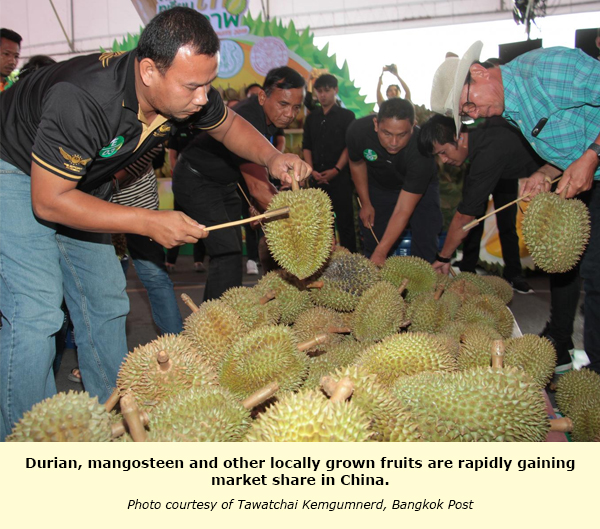The Trade Negotiations Department says shipments of fruits and vegetables to China rose by 31% year-on-year to US$1.2 billion in the January-May period, boosted by the Asean-China Free Trade Area.
Of the total value, fruit exports accounted for USD 838.61 million, up 123%, while durian represented the largest export volume, representing 48.5%, followed by longan, mangosteen and young coconut.

The remaining value was for vegetable exports. Shipments during the first five months stood at USD 361.08 million, down 33%. Cassava was the main vegetable, representing 96%, followed by beans and dried veggies.
Auramon Supthaweethum, the department’s director-general, said the country’s trade value of fruits and vegetables has benefited from the regional trade agreement since 2003.
“This agreement is such an important tool for Thailand in order to create advantages for farmers and exporters,” she said.
In 2018, the export value of fruits and vegetables shipped to China was USD 1.93 billion, up 1,312%.
For Thai fruits, the shipment to China totalled USD 1.02 billion in 2018, up 2,841%. China was ranked the third biggest export market after Hong Kong and Chile.
Vegetable exports in 2018 totalled USD 909.6 million, up 784%.
Mrs Auramon said China has high purchasing power from its 1.4 billion people.
“Before this agreement was effective in 2003, Thailand’s trade surplus with China was only USD 100.22 million, but over the first five months, the country’s trade surplus rose to USD 854.75 million,” she said.
At present, China has stringent import measures on food safety and quality. The import of fruits and vegetables should comply with the good agricultural practice (GAP) and the good manufacturing practice (GMP).
All products have to meet standards of pesticide residue quantity and agricultural pests.
“The department calls on Thai farmers and growers to comply with these measures and standards in order to maintain quality and competitiveness,” Mrs Auramon said. “They have to register their farms and plantation areas while their facilities for processed fruits and vegetables have to be traceable if they find problems.”
Source: Phusadee Arumas, Bangkok Post
